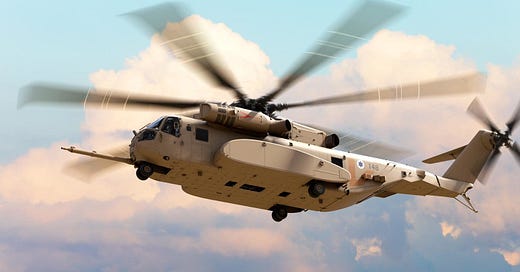Helicopter Nation
Israel's national spirit was lifted by the mechanical embodiment of its statehood.
The helicopter’s black blades spun invisibly against the night sky. I squinted up at the camel-tan body and blinking red lights as they cautiously drifted below the tree line. Sometime around 10:30 PM on Friday, November 24th, an Israeli hostage – of the first released cohort – flew overhead and towards a hospital near Tel Aviv. The helicopter’s dull buzz reverberates in my memory as I try to make sense of it all – why that moment felt equal parts historic and symbolic.
I have long harbored a theory, or more like a rant, about the difference between helicopters and airplanes. Airplanes look like they are meant to fly. Helicopters do not. Airplanes have long wings, and they resemble recreational gliders which silently soar for hours. Helicopters look like steel-glass orbs or boxy shipping containers. They are suspended in midair by brute, mechanical willpower. Airplanes are flying machines. Helicopters are machines that fly.
Among the many lessons gleaned from October 7th, we can add one more: Israel is a helicopter nation.
That title describes more than just our observable profile: small in number, headquartered in a hostile neighborhood, and the subject of much global ire. It is easy to make the case that, at first glance, we do not look poised to fly, and that we only stay metaphorically airborne by some extraordinary efforts. That is true.
But being a helicopter nation also entails having a razor-thin margin for error. Imagine you’re experiencing engine failure mid flight. Wouldn’t you rather be in an airplane than a helicopter?
Any country can be caught off guard. But when Israel is caught off guard, it becomes existentially vulnerable. Our enemies live on our doorstep, and they seek our destruction. Smelling blood, more could have joined the fray and posed a grave threat to our country. Many countries do not have sworn enemies, but merely adversaries looking for an economic leg-up. And of those countries that have enemies, it is rare to hear those enemies call for their complete annihilation. How frequently does an enemy have the intention, means, and immediate ability to destroy their target country?
Contrast Israel with the United States, which is a paradigm case of an airplane nation. Even on September 11th 2001, amidst mass hysteria and justified fear of further attacks, there was not a live threat of 3,000,000 laser-guided missiles – roughly equivalent to the 100,000 Hezbollah aims at Israel – being unleashed onto American civilian centers. Nor were there throngs of seasoned fighters awaiting command to infiltrate America’s northern border. Airplane nations have more built-in stability. It takes more damage to make them crash and burn.
In addition to their physical appearance and durability, helicopters and airplanes differ by their in-flight environment. Airplanes fly 2x faster and 3x higher than helicopters, and they offer a less turbulent flight experience. Airplanes travel above the fray, swiftly avoiding inclement weather. Flying in an airplane, you could be excused for having no idea what storms brew beneath you. Citizens of airplane nations are oftentimes oblivious to the figurative storm clouds which helicopter nations routinely navigate. They may not even know what a storm is, having only seen dark clouds from a safe distance.
Living in a helicopter nation means being well acquainted with turmoil and turbulence. Living in an airplane nation means being out of touch with the concept of a national crisis. This difference can help explain why, at least anecdotally, Israelis are frustrated when well-off Western countries opine on Israel’s military and domestic policies.
In that frustration, there is an implied, two-part accusation leveled against the international community: You are so removed from our reality that your judgment is rendered irrelevant. Not only have you not experienced our perilous flying conditions, but we also fly a helicopter while you fly an airplane. You are a country full of airplane passengers and airplane mechanics. You do not understand our experience, and your proposed solutions are not applicable to our situation.
It is generally better to be an airplane nation than a helicopter nation. Yet, there is something enviable about a self-aware helicopter nation; that is, a people which recognize their national vulnerability.
They get to work. They volunteer for and protect one another. Patriotism skyrockets. Unity is fortified or restored. That, at least, has been my experience since arriving in Israel soon after October 7th, 2023. I entered a country where everyone was reminded that ours is a helicopter nation.
The Israeli public’s perpetual motion reminds me of the synchronized helicopter blades carrying our rescued hostage to safety. They spin tirelessly, both keeping our hopes alive.
We should take pride when watching Israel’s hostages return home on helicopters. It is poetic that our national spirit was lifted by the mechanical embodiment of our statehood.




